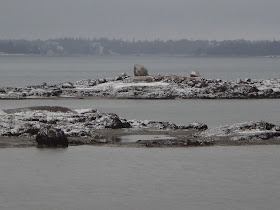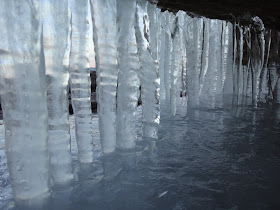--> -->
In a few days, thanks to Daylight Savings, we could enjoy
twilight until almost seven pm, and it just keeps getting later, all the way to
June 21st. It’s good to keep this in mind, reminding ourselves to
take advantage of the daylight, since on June 22 – only three and a half months
from now - we again begin the slow march toward short days and long, dark
nights. The good news is that means we have about seven months with at least as
much daylight as we have now.
Long dark nights have their merits though. Aside from giving
us a chance for binge-watching television shows or getting our socks sorted,
winter nights can launch inspired planning sessions that will help us make the
most of that short period later in the year, when the days are long and warm.
And while I like to celebrate living in the moment, inspired planning can be
its own reward as well, whether it's a flight of fancy, imagining all those
places we might go, or detailed planning. We gather our tools around us: the
charts and maps, Gazetteers and guidebooks. We imagine trips, parsing-out the
distances with a length of string, checking the current tables, imagining the
lunch stops and play spots, the places to camp. I fill notebook pages with
potential trips. Sometimes they turn into real trips.
Of course, the first thing we need to know, if we’re
car-topping our kayaks, is where we’ll launch. Aside from public access, we
need to know how difficult it is to get our boats to the water and where we’ll
park the car. We’d like to know if the high tide might reach our parking spot,
or if we return at low tide we’ll face a long slog through the mud? When I was
choosing routes for AMC’s Best Sea
Kayaking in New England, I omitted some nice places to paddle simply
because parking is a hassle or getting there is a challenge at low tide.
Unfortunately, lack of convenience… and just plain lack of
public knowledge ensures that some paddling destinations are busy and launches
become overcrowded, when in fact, there are a lot more places to access the
ocean than we might at first think. So for most trips I tried to include
multiple launches, alternate routes and resources to make planning easier.
One of these resources is the Maine Coastal Public Access Guide. Published in 2013, the guide was
put together by the Maine Coastal Program at the Maine Department of
Agriculture, Conservation and Forestry. The guide comes in three volumes,
covering tidal areas in the Southern, Midcoast and Downeast regions. That’s a
lot of shoreline- about 5,300 miles, according to the introduction, so it
shouldn’t be surprising that it covers over 700 public access areas. Not all of
these are places where you can launch a boat – it isn’t a kayaking guide – but
if you’re like me, knowing about these public access points is akin to knowing
that you have 700 backyards.
The guide works well either from an armchair-dreaming
perspective, or as a counterpart to the Gazetteer, that you keep in your car to
consult when you’re out and about. At home, I find myself going back and forth
between the full-color maps in the guide and my charts, just trying to get a
broader sense of the possibilities. I’ve encountered discrepancies between this
guide and the Gazetteer, and since I’ve gone to launches listed in the
Gazetteer only to discover that they were actually on private land, I would
tend to believe that this state-issued guide is correct. And, unlike some
listings of boat launches that favor powerboaters, this guide lists places that
aren’t launches at all, but kayakers who don’t mind a little carry could read
between the lines. The guide also lists hiking trails, which is useful, both as
a back-up plan, and to add further dimension to your experience of a place.
If you drive around a lot, you could think of this as a
guide to places where you can stop to pee without having to buy another coffee.
At eight bucks, the guide could pay for itself in just a few pee-stops.
Two weeks ago I gave my first public slideshow presentation
in support of AMC’s Best Sea Kayaking in New England. Hosted by Island Heritage
Trust, it took place on a wet, blustery evening in the lower level of a church, with 15
or 20 people in the audience, most of whom I know, but not necessarily in a
kayaking context. Anticipating that I will be speaking to a lot of people new
to the sport or who hope to get into it, I talked a bit about my personal
journey into sea kayaking. As someone who values modesty, I later found myself
replaying in my head many parts of it, wondering how full of myself I might
have sounded; there’s a fine line between bragging and telling your story for
the benefit of others. But I didn’t notice anyone falling asleep, and they even
laughed once or twice. And there have been subsequent questions about what
kayak to buy, so perhaps my story has helped spark the imaginations of others.
Before my talk, the publisher was kind enough to provide me
with an uncorrected proof… as if, in the literal sense, I needed to prove to
the audience that the long-awaited book really did exist. And then, a few days
ago, UPS showed up with the real thing:
It has been a long
journey.







Congratulations of arrival - fitting lead into spring; looking forward to reading it.
ReplyDelete